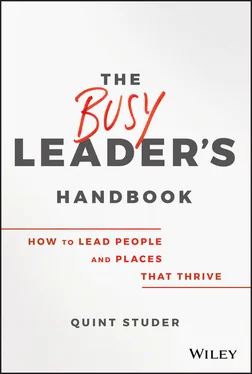Keep an accountability journal. Write down your goals and plans and regularly update what you’re doing to move toward them. Track your progress over time. Are you doing what you set out to do? If not, what might be holding you back? Exploring these issues in writing can lead to startling insights on your strengths and weaknesses.
Seize every opportunity to develop yourself. While most entrepreneurs are great at the core “skill” their venture is built on—cooking, accounting, practicing law—they haven’t typically mastered the skills it takes to run a business. They need training in basics like hiring, firing, creating revenue streams, etc. I find the most successful small business owners are those who are self-aware enough to know what they don’t know and take advantage of resources that can help.
Hire people who are smarter than you. Make sure they’re willing to challenge you (and that you’re open to being challenged). Being surrounded by a bunch of “yes men” and “yes women” isn’t going to help you grow.
Get a mentor, be a mentor (or do both). Jim Clifton, who is Gallup Chairman and CEO and author of The Coming Jobs War, writes about the need for what he calls “super mentors.” He says super mentors are those who light fires under innovators and entrepreneurs and guide and advise small businesses. He calls them “the heroes America needs for this moment in history.”
It’s true: mentoring is powerful. Whether you have a mentor or you mentor someone else, this relationship can spark tremendous growth in both parties. Great mentors know that they are not finished products and often they learn as much from the mentee as the mentee learns from them.
Don’t be afraid to change your mind. We tend to think of strong leaders as being quick, decisive, and unwavering in their decision making. Most of the time they are praised for being consistent, and their conviction seen as a source of comfort and reassurance for their team. On the other hand, leaders who change their mind or embrace a new way of thinking about something are seen as “flip floppers,” and derided for being wishy-washy or inconsistent.
The reality is that leaders who are open to learning new information and adapting their thinking accordingly are ultimately more successful. Changing your mind is not a sign of weakness but a sign that you are able to learn and grow in real time. Never tie yourself too tightly to your first conclusion. Instead, have the courage to admit that you might have been wrong and the flexibility to course correct as new information becomes available. Good leaders know that new information that contradicts their current position is not a threat but an asset to be leveraged to make their plan stronger.
There is no finish line in learning. There are always things to learn. I guess I assumed at one time that someday, I would know enough. That’s just not true. There is always more to learn, and teachers present themselves in many different ways. When the student is ready, the teacher appears. Remaining teachable is key.
Becoming self-aware and coachable doesn’t mean striving for perfection. None of us will ever be perfect. It does mean identifying the worst flaws that hold us back and sincerely working to repair them. It means knowing which tasks to delegate, and when to seek the advice of experts. It means realizing more each day just how much we don’t know.
This is a journey that we’ll never finish. Our main job as a leader is to make sure that we’re always headed in the right direction on the path.
2 Invite Feedback from Others and Don’t Take It Personally; Instead, Take Ownership
Don’t take anything personally.” This is the second of the Four Agreements—from the book The Four Agreements: A Practical Guide to Personal Freedom by Don Miguel Ruiz—that I try hard to live by. Ruiz writes that we should not take what happens around us personally because the actions of others have nothing to do with you, but rather are about them.
Although I do believe this, I also believe it does not mean we shouldn’t listen to and learn from others. I recall a time when a CEO said to me that one of the senior executives had taken the low employee satisfaction results in their area personally and that she advised him not to do so. My response was they should take the results personally for those areas they lead. This appears confusing when considered alongside Ruiz’s words.
In thinking about this paradox, I have some thoughts and suggestions:
How can we interpret results or feedback in such a way that we don’t take it personally but that we learn and grow from it? Our first thought must be that the sender of the message is not trying to be hurtful but helpful. As discussed in Chapter 1, the two most vital characteristics in personal growth are self-awareness and coachability. Feedback that creates self-awareness is meant to be helpful. Having an outside perspective is valuable; remember, an artist can draw someone else better than they can draw themselves.
When we take something personally in the way that Ruiz writes about it, it can lead to unhealthy emotions, such as anger and resentment. These emotions can lead to actions that prevent one from performing a self-inventory and create situations that are unhealthy for everyone. Yes, it may feel good for a brief moment to vent, gossip, and get revenge, but rarely do these responses lead to a productive outcome.
I tend to divide people’s reactions into two categories: taking it personally or taking ownership of it. The two are similar in some ways but create vastly different actions. The senior executive needs to take ownership of the poor results. What isn’t helpful is blaming yourself, or beating yourself up without improving, or being upset to the point that it delays or prevents you from taking positive steps forward.
Here are a few suggestions to help you move past taking feedback personally.
1 Do a self-assessment. Is the feedback accurate? If not, is some of it right? If possible, try to find an objective measurement. Be honest with yourself. The goal is progress, not perfection.
2 If you’re not sure the feedback is accurate, find someone you trust and ask them to provide a second opinion. This can be a mentor, close colleague, friend, or family member.
3 Consider where the person is coming from, their motivation, and their emotional state. Senders can have issues. An angry person may lash out, a jealous person may say negative things, etc. Take in what fits and leave the rest behind. Sadly, people can be very mean-spirited and attempt to be hurtful. By being self-aware, with the help of others, this becomes easier and easier. However, it sure is difficult at times.
If a person is giving you negative feedback because of a past interaction with you, be aware of it but don’t accept responsibility for their reaction. An example is when you hear a person say things like, “You made me angry,” “You made me cry,” “You made me make a mistake,” “You made me happy.” While we need to take ownership of our own actions, the other person must own their responses, both positive and negative.
1 Be kind to yourself. We are all human beings. Of course, when we read or hear something about ourselves or others we care about, we will be hurt. This is normal, but try to put it in perspective and look at it as an opportunity to practice forgiveness, self-care, and hopefully the pursuit of personal growth. Don’t beat yourself up or take unhealthy actions that might make the situation worse.
Make sure you’re allowing people to give you feedback. I often find that leaders do not receive helpful feedback because of how they’ve handled it in the past. If we have reacted with silent hurt or anger, people will be reluctant to provide it again. Let the person know you will appreciate their feedback and can handle it.
Читать дальше












